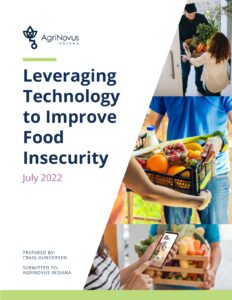 INDIANAPOLIS (July 14, 2022) — AgriNovus Indiana, a non-profit focused on growing Indiana’s agbioscience economy, released a study today identifying the need for technology and new business models to improve the $100+ billion annual federal Supplemental Nutrition Assistance Program (SNAP).
INDIANAPOLIS (July 14, 2022) — AgriNovus Indiana, a non-profit focused on growing Indiana’s agbioscience economy, released a study today identifying the need for technology and new business models to improve the $100+ billion annual federal Supplemental Nutrition Assistance Program (SNAP).
Authored by national food policy expert and Snee Family Endowed Chair at Baylor University, Dr. Craig Gundersen, the study, Leveraging Technology to Improve Food Insecurity, identifies challenges hindering SNAP recipients and recommends adoption of technologies and process improvements to help food-insecure Americans.
“SNAP is a critical safety net for millions of Americans,” said Mitch Frazier, president and CEO of AgriNovus Indiana. “This new research provides data and key recommendations to inspire innovators to bring new approaches to better connect food supply to those who are food insecure.”
Key recommendations identified in the study include:
- Identifying ways to eliminate delivery costs for SNAP recipients – food retailers need to recoup the costs of delivering food and there are various ways to do so, including minimum expenditure levels or delivery fees. While the latter would be burdensome, setting a minimum expenditure for free delivery would likely be of benefit to a large percentage of SNAP benefit recipients.
- Lowering barriers for stores to enter the program – small retail stores are a critical source of food for SNAP recipients, especially in rural communities. Some of these stores, however, may not meet the requirements to be online grocers or do not have the resources to apply for the program. Easing regulations for stores to enter the program would open up the opportunity for more participation.
- Ensuring the same shopping experience for SNAP and non-SNAP recipients – the program’s success can be largely attributed to dignity and autonomy granted to recipients as they make their food choices. Those same principles should be maintained in any online system, allowing for the same food choices for non-SNAP recipients and SNAP recipients.
“Applying innovation to SNAP creates massive potential impact for benefit recipients,” said Craig Gundersen, economist at Baylor University. “Indiana’s strength in tech and agriculture creates an enviable ecosystem to eliminate the barriers faced by SNAP participants and to connect them to better nutrition regardless of location.”
The study was conducted in tandem with the AgriNovus HungerTech Challenge where innovators are competing for a $25,000 grand prize by developing new technologies to enable SNAP recipients to purchase groceries online and receive products regardless of location. A winning team will be announced in a virtual showcase on July 19. Register to attend the showcase here.
The full study, Leveraging Technology to Improve Food Insecurity, is available at www.AgrinovusIndiana.com.
The launch of the study follows the publication of AgriNovus-commissioned research conducted by EY-Parthenon and Purdue University entitled “Resilience through disruption: The impact of the pandemic on Indiana and the future of food and agriculture.” That research found food insecurity impacts 11% of the United States population and 13% of Hoosiers. Moreover, 22% of Indiana residents live in food deserts with low access to healthy nutrition.
About AgriNovus Indiana
AgriNovus Indiana is the state’s initiative focused on advancing the agbiosciences sector as a nationally recognized leader through education, research and talent development; strategic collaborations among corporations, industry associations, government and universities; the creation and support of new companies; and branding and targeted promotions to elevate the sector. AgriNovus Indiana is part of the Central Indiana Corporate Partnership (CICP), an effort dedicated to the region’s continued prosperity and growth. To learn more about AgriNovus Indiana, visit www.agrinovusindiana.com.
